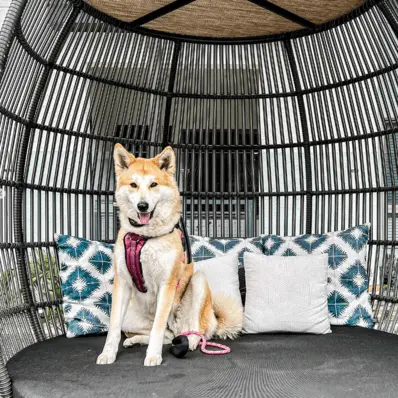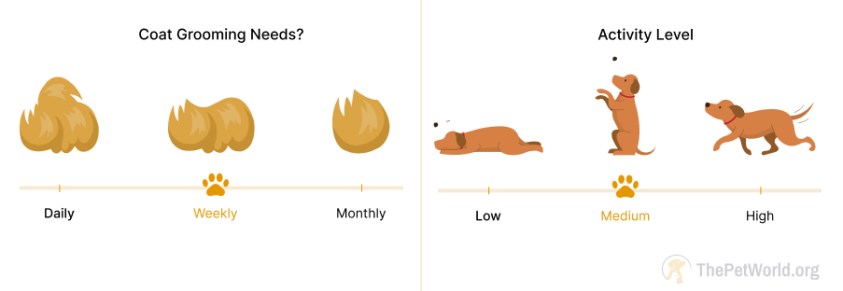Akita Shepherd History/Origin
The exact origins of the Akita Shepherd mixed breed are unknown, but it is believed that they were developed in Germany in the late 19th century.
German Shepherds were mixed with other breeds, including the Akita, to create a dog that retained the best traits of both parents.
The German Shepherd is one of the most popular dog breeds in America today and has a long history as a working dog. They were originally bred in Germany in the late 1800s for herding sheep and guarding property.
The Akita Inu is an ancient Japanese breed, historically used for hunting boar and bear. They were also employed in dog fighting contests popular among Japanese nobility in Feudal times.
The resulting breed was larger and had a more robust build than either parent, making them well-suited for working in harsh conditions.
Akita Shepherd Personality
The Akita Shepherd, a mix of the Akita Inu and the German Shepherd, has a serious and protective personality.
It’s naturally reserved with strangers and may take time to warm up to new people, animals, or kids. However, once they feel at ease, they can be surprisingly playful and energetic, especially with their family. They’re fiercely loyal but can show aggression if they feel threatened or uncertain.
- Temperament
Akita Shepherds are known for their loyalty and protectiveness. They form strong bonds with their family but can be cautious around strangers.
Early socialization is key to helping them feel confident in different situations. They’re intelligent and can learn complex tasks with proper training.
Despite their independent streak, they enjoy spending time with their owners, relaxing after an active day. With patience and training, they make devoted and rewarding companions.
- Behavioral issues
Akita Shepherds are known for their loyalty, intelligence, and protective instincts. However, they may show aloof or protective behavior around strangers due to their strong guarding instincts. Without early socialization and training, they can become overly territorial or reactive, potentially displaying aggression or fear-based behaviors.
Additionally, their independent nature and strong-willed temperament can pose challenges for inexperienced owners, requiring consistent leadership and positive reinforcement training methods to establish boundaries and encourage desired behaviors. Therefore, early training and socialization are essential for ensuring a well-adjusted and balanced Akita Shepherd companion.
Akita Shepherd Physical Appearance
In appearance, Akita Shepherds closely resemble their namesake breed, the Akita. They have a thick double coat, usually white with black or brown markings. They also have strong jaws and broadheads.
However, there are some key differences between Akitas and Akita Shepherds.
For one thing, Akita Shepherds are typically more muscular than their purebred cousins. They also have shorter muzzles and smaller ears.
Here are the features the Akita Shepherd cross gets from its parent breeds Akita and German Shepherd:
| Physical Characteristics | Akita Shepherd | Parent Breed |
| Size | Large | Both |
| Coat Color | Varied (black, tan, white) | Both |
| Temperament | Serious, reserved, protective | Both |
| Energy Level | Moderate to high | Both |
| Body Structure | Muscular | Akita Inu |
| Ear Shape | Erect | Akita Inu |
| Tail Shape | Bushy, curled | Akita Inu |
| Facial Features | Strong, sturdy | German Shepherd |
| Eye Color | Dark | Both |
| Life Span | 10-13 years | Both |
- Size
Akita Shepherds are large and muscular dogs, typically standing between 24 to 28 inches at the shoulder. Their robust build and strong bone structure give them a commanding presence, suitable for their roles as guardians and working companions.
- Coat Color
Their coat colors can vary widely, including black, tan, red, brown and white.
Akita Shepherds often exhibit a striking combination of colors and even different patterns like brindle. Additionally, their dense double coat provides insulation and protection against various weather conditions, allowing them to thrive in diverse environments.
Brown Akita Shepherd- Source : Pinterest
Sable Akita Shepherd- Source: akitashepherd
Akita Shepherd Gender Differences
While both male and female Akita Shepherds may have some things, there are some notable differences between the sexes:
- Size
Generally, male Akita Shepherds tend to be slightly larger and more muscular compared to females. Males typically have more bone structure and muscle mass, which contributes to their larger size.
- Temperament
In terms of temperament, male Akita Shepherds often exhibit a more dominant and assertive demeanor. They may assert themselves more prominently in social interactions and may require firm leadership from their owners to establish boundaries.
On the other hand, female Akita Shepherds tend to display a gentler and more nurturing demeanor. They may be more affectionate and maternal, especially towards their human family members or other pets in the household.
- Energy Levels
While energy levels can vary widely among individual dogs, male Akita Shepherds may have slightly higher energy levels compared to females. They may be more inclined towards activities that require physical exertion and stimulation.
Akita Shepherd Feed/Nutrition
A well-balanced diet is essential to maintain the health and vitality of an Akita Shepherd. High-quality dog food formulated for large breeds is recommended.
The amount of food your Akita Shepherd needs will depend on a few factors, including age, activity level, and whether or not they are spayed or neutered.
Additionally, safe fruits like mango and pineapple can be offered as occasional treats, but only in moderation to avoid digestive issues.
In general, however, most adult Akita Shepherds will need about 2-3 cups of high-quality dry food per day, divided into two meals.
On the other hand, Puppies will need more frequent meals throughout the day to support their rapid growth and development.
This breed is also prone to Bloat, which is why it’s especially important to watch out for the portion sizes you are feeding them.
Akita Shepherd Health
Like all breeds, Akita Shepherds may be prone to certain health issues, including hip dysplasia, bloat, and allergies.
- Canine Gastric Torsion: Bloat (GDV) is a life-threatening condition where the stomach fills with gas, causing it to twist. It can lead to severe pain, difficulty breathing, and shock, requiring immediate veterinary intervention.
- Allergies: Akita Shepherds may develop allergies to various triggers, resulting in itching, skin irritation, or gastrointestinal issues. Identifying and managing allergens through testing and medication can help alleviate symptoms.
- Elbow and Hip Dysplasia: Hip dysplasia and elbow dysplasia involve abnormal joint development, causing pain and reduced mobility. Treatment may include medication, weight management, and surgery to improve joint function.
- Von Willebrand’s Disease: Von Willebrand’s Disease is a hereditary bleeding disorder that impairs blood clotting, leading to prolonged bleeding from minor injuries or surgeries. Management involves avoiding activities that increase bleeding risk and veterinary care for clotting support when needed.
Routine veterinary check-ups, a nutritious diet, and regular exercise can help mitigate these risks and ensure a long and healthy life for your pet.
Akita Shepherd Care and Grooming
Akita Shepherds require regular care and grooming to keep them healthy and comfortable:
- Brushing: Their dense double coat needs regular brushing to remove loose fur and prevent mats and tangles. A slicker brush or grooming rake is effective in reaching the undercoat and removing dead hair. Brushing at least once a week is usually enough. However, during shedding you may need to brush them more frequently.
- Bathing: Bathing should be done as needed, typically every 6-8 weeks or when they become dirty or smelly. Use a mild dog shampoo and ensure thorough rinsing to prevent skin irritation. Avoid over-bathing, as it can strip the coat of its natural oils, leading to dryness and irritation.
- Nail Trimming: Regular nail trimming is essential to prevent overgrowth, which can cause discomfort and affect their gait. Trim nails every 4-6 weeks or as needed, taking care to avoid cutting the quick, which can cause bleeding and pain. If you’re uncomfortable with trimming your dog’s nails, consider seeking professional grooming assistance.
Proper and regular dental care helps prevent dental issues like tartar buildup and gum disease. Regularly brush their teeth with dog toothpaste and a toothbrush to remove plaque and bacteria.
Check their ears regularly for infection, clean gently, and schedule vet check-ups for overall health. Don’t forget to leash train your dog for better walks. This routine care helps ensure your Akita Shepherd stays healthy and happy.
Akita Shepherd Price
The price of an Akita Shepherd typically ranges from $1,000 to $3,000, depending on the breeder, pedigree, and location.
When considering purchasing an Akita Shepherd puppy, it’s crucial to research reputable breeders who prioritize the health and well-being of their dogs. Here are some sources you can buy or adopt Akita and German Shepherd mixes:
Akita Shepherd Rescue Groups
If you’re interested in adopting an Akita Shepherd there are several rescue groups dedicated to Akita and German Shepherd mixes. These organizations work to shelter dogs and provide them a chance at a loving home:
Interesting Facts
- Both parent breeds have a long history of working alongside humans, and the Akita Shepherd inherits their strong work ethic and willingness to learn.
- With their intelligence and versatility, Akita Shepherds excel in various roles, including search and rescue, therapy work, and competitive obedience.
Best For
The Akita Shepherd is best suited as a family guard dog, providing loyalty and protection to its household. Active individuals or experienced families will appreciate its strength and energy for outdoor activities.
Akita Shepherd Top Names
| Male Akita Shepherd Names | Female Akita Shepherd Names |
| Zeus | Luna |
| Thor | Maya |
| Max | Sasha |
| Bear | Bella |
| Duke | Ava |









 Akita Inu- Source:
Akita Inu- Source:  German Shepherd- Source:
German Shepherd- Source: 

 Brown Akita Shepherd- Source :
Brown Akita Shepherd- Source :  Sable Akita Shepherd- Source:
Sable Akita Shepherd- Source: 







